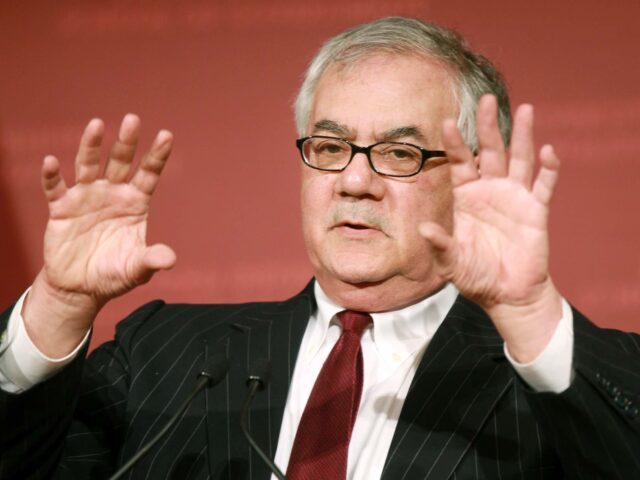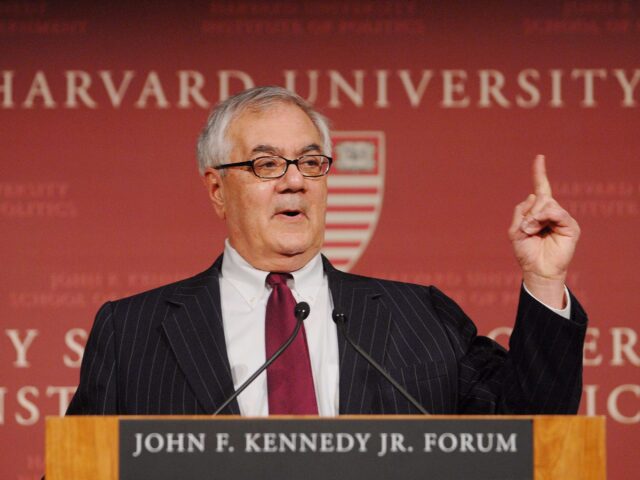Former Rep. Barney Frank (D-MA) is at the center of another financial crisis — this time on the board of now-defunct Signature Bank, which was closed by New York State and taken over by federal authorities on Sunday.
Ironically, given his general zeal for regulation, and the Dodd-Frank law that bears his name, Frank has pushed back against claims that regulatory easing caused the panic that took down Signature and Silicon Valley Bank.
Instead, Frank blamed government hostility to the cryptocurrency industry, which his bank had supported. And as a board member, he had once argued that smaller banks should be exempt from the regulations he created.
Whatever the reason, it is hard to ignore Frank’s curious presence at the scene of yet another oversight failure that could take down the entire financial system.
In 2008, as the financial crisis unfolded, Frank chaired the House Financial Services Committee. The meltdown happened on his watch — after he and fellow Democrats had zealously resisted efforts to regulate Fannie Mae and Freddie Mac, leading to the subprime mortgage crisis.
In April 2009, Frank — still in charge of the committee, and tasked with writing new legislation to regulate the country’s large financial institutions — came to Harvard’s Kennedy School of Government to give a speech.

U.S. Rep. Barney Frank, D-Mass., chairman of the House Financial Services Committee, addresses an audience at the John F. Kennedy School of Government, on the campus of Harvard University, in Cambridge, Mass., Monday, April 6, 2009. (AP Photo/Steven Senne)
It was an evening that would change my life.
My fiancée and I were both about to graduate — she from college with a degree in economics, and me from law school. Neither of us had jobs yet, thanks in part to the recession.
We decided to go to the lecture out of simple interest. I happened to have been studying tax law in my final semester, and I had planned to ask a question about the constitutionality of a tax on Wall Street bonuses.
But as I stood in line behind the microphone, waiting my turn, I became astonished at Frank’s approach to the crisis, which he sought to blame squarely on Republicans, all the way back to President Taft a century before.
So when my turn came, I asked: “How much responsibility, if any, do you have for the financial crisis?”
He blew up at me.
But I had also just taken a trial advocacy course, and had learned how to handle a hostile witness.
So I asked the question again.
We went back-and-forth for several minutes, much to the audience’s delight, and then I went home. I thought the exchange might merit a mention in the Harvard Crimson, but nothing more.
As it happened, there was a camera from the local Fox affiliate in the room. They aired the argument, and it was picked up by the Drudge Report.
Suddenly, I was famous — and everyone, even MSNBC, wanted an interview.
Looking back, I think what resonated with people was the idea that a student — nobody, really — could stand up to one of the most powerful members of Congress.
You have to remember the political atmosphere of the time: Barack Obama had just taken office, and there was a new and stifling sense of political correctness. A new elite felt entitled to dictate terms to everyone.
This was the time when Miss California, Carrie Prejean, lost her title because she defended states’ prerogatives to define their own marriage laws — the same position as Obama.
After being at the mercy of powerful people for months — first the titans of Wall Street, then the big shots of the Beltway — many people, even Democrats, enjoyed watching a big ego being punctured by a simple question. I even received a congratulatory email from Professor Laurence Tribe, who thought the whole thing was great.
For 48 hours — until I went offline for the Jewish holiday of Passover — my life was a whirlwind. When I came back to campus, the dean’s office asked me to pick up my fan mail.
Then the Illinois Republican Party called.
The GOP wanted to run candidates in as many districts as possible, and they were looking for a candidate to challenge Rep. Jan Schakowsky (D-IL), my hometown representative.
It was a tough decision. I had already decided to take the California Bar exam. And plenty of people told me to challenge Frank, though I thought (wrongly) that he was invincible, as the first openly gay member of Congress. But in the end, I decided to give it a try.
It was an uphill climb against an entrenched Democrat incumbent in a deep-blue district. Yet conservatives came out of the woodwork to support me.
And I befriended conservative media pioneer Andrew Breitbart.
After the election, I pitched Andrew on the idea of joining his startup company. He eventually agreed, and I moved out to L.A.
I worked alongside Andrew — through Weinergate and the rest of it — until he died in 2012.
I’m still here (and Schakowsky is still in Congress). But Barney Frank somehow found his way to a bank. The man who was supposed to have protected us from another financial meltdown is again at the center of one.
Once again, it’s not his fault. He’s probably right that the Trump-era rollback of Dodd-Frank regulations — which was backed by members of both parties in Congress — did not lead to the current banking crisis.
The likelier cause, as Silicon Valley investor David Sacks explained in a detailed Twitter thread, was simply poor management, as interest rates rose rapidly to fight inflation that was set off by President Joe Biden’s spending.
I’d add that Frank’s assurances in 2009 that new regulations would protect the system may have encouraged reckless behavior by banks and their customers.
Not to worry: Biden says new regulations will be even better.
Joel B. Pollak is Senior Editor-at-Large at Breitbart News and the host of Breitbart News Sunday on Sirius XM Patriot on Sunday evenings from 7 p.m. to 10 p.m. ET (4 p.m. to 7 p.m. PT). He is the author of the new biography, Rhoda: ‘Comrade Kadalie, You Are Out of Order’. He is also the author of the recent e-book, Neither Free nor Fair: The 2020 U.S. Presidential Election. He is a winner of the 2018 Robert Novak Journalism Alumni Fellowship. Follow him on Twitter at @joelpollak.

COMMENTS
Please let us know if you're having issues with commenting.